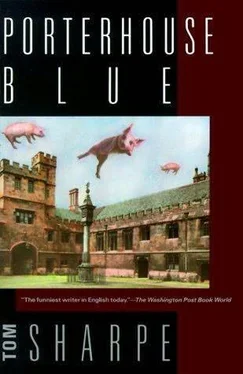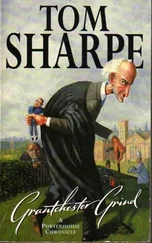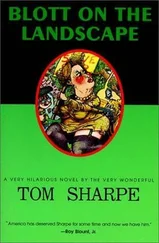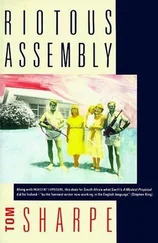Tom Sharpe - Porterhouse Blue
Здесь есть возможность читать онлайн «Tom Sharpe - Porterhouse Blue» весь текст электронной книги совершенно бесплатно (целиком полную версию без сокращений). В некоторых случаях можно слушать аудио, скачать через торрент в формате fb2 и присутствует краткое содержание. Жанр: Современная проза, на английском языке. Описание произведения, (предисловие) а так же отзывы посетителей доступны на портале библиотеки ЛибКат.
- Название:Porterhouse Blue
- Автор:
- Жанр:
- Год:неизвестен
- ISBN:нет данных
- Рейтинг книги:4 / 5. Голосов: 1
-
Избранное:Добавить в избранное
- Отзывы:
-
Ваша оценка:
- 80
- 1
- 2
- 3
- 4
- 5
Porterhouse Blue: краткое содержание, описание и аннотация
Предлагаем к чтению аннотацию, описание, краткое содержание или предисловие (зависит от того, что написал сам автор книги «Porterhouse Blue»). Если вы не нашли необходимую информацию о книге — напишите в комментариях, мы постараемся отыскать её.
Porterhouse Blue — читать онлайн бесплатно полную книгу (весь текст) целиком
Ниже представлен текст книги, разбитый по страницам. Система сохранения места последней прочитанной страницы, позволяет с удобством читать онлайн бесплатно книгу «Porterhouse Blue», без необходимости каждый раз заново искать на чём Вы остановились. Поставьте закладку, и сможете в любой момент перейти на страницу, на которой закончили чтение.
Интервал:
Закладка:
“Women in College too.”
“What? Living in College?”
“That’s it. Living in College.”
“That’s unnatural, Mr Skullion. Unnatural.”
“You don’t have to tell me that, Chef. You don’t have to tell me. Unnatural and immoral. It isn’t right. Chef, it’s downright wicked.”
“And self-service in Hall,” the Chef muttered. “What’s the world coming to? You know, Mr Skullion, when I think of all the years I’ve been Chef to the College and all the dinners I’ve cooked for them, I sometimes, wonder what’s the meaning of it all. They’ve got no right to do it.”
“It’s not them that’s doing it,” Skullion told him. “It’s him that says it’s got to change.”
“Why don’t they stop him? They’re the Council. He can’t do it without their say-so.”
“They can’t stop him. Threatened to resign if they didn’t agree.”
“Why didn’t they let him? Good riddance to bad rubbish.”
“Threatened to write to the papers and tell them we’ve been selling degrees,” Skullion said.
The Chef looked at him with alarm.
“You don’t mean he knows about your…”
“I don’t know what he knows and what he don’t,” Skullion said. “I don’t think he knows about them. I think he’s talking about the ones they let in because they’ve got money. I think that’s what he means.”
“But we’ve a right to let in who we like,” the Chef protested. “It’s our college. It’s not anyone else’s.”
“That’s not the way he sees it,” Skullion said. “He’s threatened them with a national scandal if they don’t toe the line and they’ve agreed.”
“What did the Dean say? He must have said something.”
“Said they’d got to buy time by seeming to agree. He’s gone to see the General now. They’ll think of something.”
Skullion finished his wine and smiled to himself. “He don’t know what he’s tackled,” he said more cheerfully.
“Thinks he’s dealing with the pipsqueaks in Parliament, he does. Wordmongers, that’s what MPs are. Think you’ve only got to say a thing for it to be there next day. They don’t know nothing about doing and they don’t have nothing to lose, but the Dean’s a different kettle of fish. He and the General, they’ll do him down. See if they don’t.” He grinned knowingly and winked his unblacked eye. The Chef nibbled a grape moodily.
“Don’t see how they can,” he said.
“Digging for dirt,” said Skullion. “Digging for dirt in his past, that’s what the Dean said.”
“Dirt? What sort of dirt?”
“Women,” said Skullion.
“Ah,” said the Chef. “Disreputable women.”
“Precisely, Chef, them and money.”
The Chef pushed his hat back on his head. “He wasn’t what you might call a rich undergrad, was he?”
“No,” said Skullion, “he wasn’t.”
“And he’s rich now.”
“Married it,” Skullion told him. “Lacey money, that’s what it is. Lady Mary’s money. That’s the sort of man he is, Sir Godber.”
“Boney woman. Not my cup of tea,” said the Chef. “Like something with a bit more meat to it myself. Wouldn’t be surprised if he hadn’t got a fancy woman somewhere.”
Skullion shook his head doubtfully. “Not him. Not enough guts,” said Skullion.
“You don’t think they’ll find anything then?”
“Not that sort of thing. They’ll have to bring pressure. Influential friends the College has got, the Dean said. They’ll use them.”
“They’d better use something. I’m not staying on to run a self-service canteen and have women in my Hall,” said the Chef.
Skullion got up from the table and put on his coat. “The Dean’ll see to it,” he said and climbed the stairs to the Screens. The wind had blown snow on to the steps and Skullion turned up the collar of his coat. “Got no right to change things,” he grumbled to himself, and went out into the night.
At Coft Castle the Dean and Sir Cathcart sat in the library, a decanter of brandy half empty on the table beside them and their thoughts bitter with memories of past greatness.
“England’s ruin, damned Socialists,” growled Sir Cathcart. “Turned the country into a benevolent society. Seem to think you can rule a nation with good intentions. Damned nonsense. Discipline. That’s what this country needs. A good dose of unemployment to bring the working classes to their senses.”
“Doesn’t seem to work these days,” said the Dean with a sigh. “In the old days a depression seemed to have a very salutary effect.”
“It’s the dole. Man can earn more not working than he can at his job. All wrong. A bit of genuine starvation would soon put that right.”
“I suppose the argument is that the wives and children suffer,” said the Dean.
“Can’t see much harm in that,” the General continued. “Nothing like a hungry woman to put some pep into a man. Reminds me of a painting I saw once. Lot of fellows sitting round a table waiting for their dinner and the lady of the house comes in and lifts the cover of the dish. Spur inside, what? Sensible woman. Fine painting. Have some more brandy?”
“That’s very kind of you,” said the Dean, proffering his glass.
“Trouble with this Godber Evans fellow is he comes from poor stock,” continued Sir Cathcart when he had filled their glasses. “Doesn’t understand men. Hasn’t got generations of county stock behind him. No leadership qualities. Got to have lived with animals to understand men, working men. Got to train them properly. A whack on the arse if they do something wrong and a pat on the head if they get it right. No use filling their heads with a whole lot of ideas they can’t use. Bloody nonsense, half this education lark.”
“I quite agree,” said the Dean. “Educating people above their station has been one of the great mistakes of this century. What this country requires is an educated elite. What it’s had in fact, for the past three hundred years.”
“Three meals a day and a roof over his head and the average man has nothing to grumble about. Stout fellows. The present system is designed to create layabouts. Consumer society indeed. Can’t consume what you don’t make. Damned tommy-rot.”
The Dean’s head nodded on his chest. The fire, the brandy and the ubiquitous central heating in Coft Castle mingled with the warmth of Sir Cathcart’s sentiments to take their toll of his concentration. He was dimly aware of the rumble of the General’s imprecations, distant and receding like some tide going out across the mudflats of an estuary where once the fleet had lain at anchor. All empty now, the ships gone, dismantled, scrapped, the evidence of might deplenished, only a sandpiper with Sir Godber’s face poking its beak into the sludge. The Dean was asleep.
Chapter 9
Zipser stirred on the floor of his room. His face in contact with the carpet felt sore and his head throbbed. Above all he was cold and stiff. He turned on his side and stared at the window, where an orange glow from the sky over Cambridge shone dimly through the falling snow. Slowly he gathered himself together and got to his feet. Feeling distinctly weak and sick he went to the door and turned on the light and stood blinking at the two large cartons on the floor. Then he sat down hurriedly in a chair and tried to remember what had happened to him and why he was the possessor of two gross of guaranteed electronically tested 3-teat vending machine pack contraceptives. The details of the day’s events slowly returned to him and with them the remembrance of his misunderstanding with the Dean. “Gated for a week,” he murmured and realized the implications of his predicament. He couldn’t deliver the beastly things to the Unicorn now and he had signed the slip at the wholesale office. Enquiries would be made. The barman at the Unicom would identify him. So would the wretched clerk at the wholesale office. The police would be informed. There would be a search. He’d be arrested. Charged with being in felonious possession of two gross of… Zipser clutched his head in his hands and tried to think what to do. He’d have to get rid of the things. He looked at his watch. Eleven o’clock. Got to hurry. Burn them? He looked at the gas fire and gave up the idea. Out of the question. Flush them down the lavatory? Better idea. He threw himself at the cartons and began to open them. First the outer carton, then the inner one, then the packet itself and finally the foil wrapper. It was a laborious job. He’d never do it. He’d got to do it.
Читать дальшеИнтервал:
Закладка:
Похожие книги на «Porterhouse Blue»
Представляем Вашему вниманию похожие книги на «Porterhouse Blue» списком для выбора. Мы отобрали схожую по названию и смыслу литературу в надежде предоставить читателям больше вариантов отыскать новые, интересные, ещё непрочитанные произведения.
Обсуждение, отзывы о книге «Porterhouse Blue» и просто собственные мнения читателей. Оставьте ваши комментарии, напишите, что Вы думаете о произведении, его смысле или главных героях. Укажите что конкретно понравилось, а что нет, и почему Вы так считаете.












